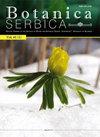Investigation of phenolic compounds, in vitro antioxidant and enzyme inhibition activities of methanol and aqueous extracts of different parts of Glaucosciadium cordifolium
IF 1.1
4区 生物学
Q4 PLANT SCIENCES
引用次数: 3
Abstract
The present study was designed to evaluate the biological potentials and phenolic composition of different parts of Glaucosciadium cordifolium, which is less investigated and known as a wild endemic species to Turkey. The antioxidant activity of the plant was determined using 2,2-diphenyl-1-picrylhydrazyl (DPPH), 2,2'-Azinobis-(3-Ethylbenzthiazolin-6-Sulfonic Acid) (ABTS), iron chelating capacity, and a ?-carotene / linoleic acid emulsion assay. The total phenol and flavonoid contents of the plant were determined using the Folin-Ciocalteu and aluminum chloride methods, respectively. The study of the enzyme inhibition activity of the plant was carried out for acetylcholinesterase, butyrylcholinesterase, ?-glucosidase, ?-amylase, and tyrosinase. The antiglycation activity of the aqueous extract of the plant was evaluated using established methods such as browning, a Nitroblue-tetrazolium (NBT) assay, the 2,4-dinitrophenyl hydrazine (DNPH) method, a Congo red assay, and fluorescent Bovine Serum Albumin (BSA). The HPLC profiling of the phenolics revealed that 18 standard phenolic compounds were found in different amounts in various extracts of the plant parts. According to our bioactivity results, the methanol extract obtained from the flower parts of the plant contained higher amounts of phenolic compounds and flavonoids, which also demonstrated the highest DPPH radical scavenging activity. In addition, the methanol extracts obtained from the leaves and roots were found to be the most active extracts against the acetylcholinesterase enzyme, as well as moderately active against the tyrosinase enzyme. The antiglycation capacity of the extract followed this order: G. cordifolium leaves > stems > roots > flower. As a result, our study indicated that G. cordifolium extracts have strong antioxidant potential, good enzyme inhibitory effects and antiglycation potential. Further studies on G. cordifolium with in vivo bioassays need to be carried out to seek the importance of the plant in pharmaceutical techniques.青花草不同部位甲醇及水提物的酚类化合物、体外抗氧化及酶抑制活性研究
本研究旨在评价土耳其特有野生植物青花草(Glaucosciadium cordifolium)的生物学潜力和不同部位的酚类成分。采用2,2-二苯基-1-吡啶肼(DPPH)、2,2'-氮化氮-(3-乙基苯并噻唑-6-磺酸)(ABTS)、铁螯合能力和-胡萝卜素/亚油酸乳状液法测定了该植物的抗氧化活性。采用福林- ciocalteu法和氯化铝法分别测定该植物的总酚和总黄酮含量。研究了该植物对乙酰胆碱酯酶、丁酰胆碱酯酶、-葡萄糖苷酶、-淀粉酶和酪氨酸酶的抑制活性。采用褐变法、硝基蓝-四氮唑(NBT)法、2,4-二硝基苯肼(DNPH)法、刚果红法和荧光牛血清白蛋白(BSA)等方法评估该植物水提取物的抗糖化活性。酚类化合物的HPLC图谱显示,在植物各部位的不同提取物中发现了18种不同量的标准酚类化合物。根据我们的生物活性结果,从植物的花部分得到的甲醇提取物含有较多的酚类化合物和类黄酮,也显示出最高的DPPH自由基清除活性。此外,从叶和根中提取的甲醇提取物对乙酰胆碱酯酶活性最高,对酪氨酸酶活性中等。其抗糖化能力的大小顺序为:堇叶>茎>根>花。因此,我们的研究表明,堇叶提取物具有较强的抗氧化潜力,良好的酶抑制作用和抗糖基化潜力。进一步的研究需要进行体内生物测定,以寻求该植物在制药技术中的重要性。
本文章由计算机程序翻译,如有差异,请以英文原文为准。
求助全文
约1分钟内获得全文
求助全文
来源期刊

Botanica Serbica
Agricultural and Biological Sciences-Plant Science
CiteScore
1.40
自引率
12.50%
发文量
17
审稿时长
34 weeks
期刊介绍:
Botanica Serbica publishes original research papers on all aspects of plant, fungal and microbial biology research including the disciplines of microbiology, mycology, lichenology, bryology, flora, vegetation, biogeography, systematics, taxonomy, plant biotechnology, plant cell biology, plant ecology, environmental plant biology, forestry, genomics, horticulture, limnology, metabolomics, molecular biology, proteomics, virology, plant conservation and protection, and wildlife and ecosystem management.
 求助内容:
求助内容: 应助结果提醒方式:
应助结果提醒方式:


